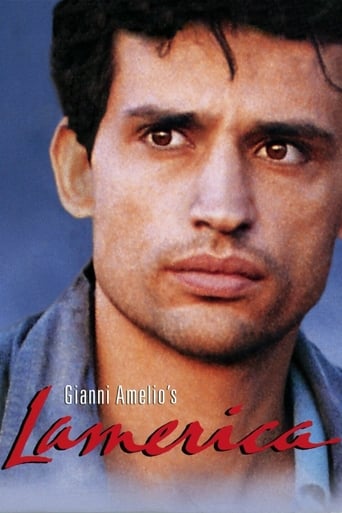runamokprods
In many ways a more sophisticated, complex, political re-telling of Amelio's great 'Stolen Children'. In this case two Italians go to just post communist Albania to try and make a killing setting up an exploitative factory, taking advantage of the desperately poor local workers. They hire a half- crazed old man to be the necessary local figurehead. (The local is amazingly played by a non- actor.)Then, of course, everything in their plan goes wrong.Tremendously moving, with only brief whiffs of manipulation or easy emotion. A portrait of colonialism and capitalism crashing into communist bureaucracy, and leaving behind shattered souls.
Chris Knipp
In his 1994 Lamerica Gianni Amelio raises traditional linear Italian film-making to new heights using the methods of neorealism to carry his audience along on a dreamlike, ironic mythologizing journey whose mood and methods are all his own. This very powerful film, which is as fantastic as it is vividly concrete and sad (imagine Kafka with a Sicilian accent), tells the story of two Italians, Fiore (Michele Placido, director of the recent Romanzo criminale) and his assistant Gino (Enrico Lo Verso) who come to the impoverished, wrecked post-communist Albania with the scam of setting up a shell shoe factory as what they -- or Fiore, at least, because he alone is the mastermind and evil genius of the scam -- thinks will be a profitable tax shelter. They corrupt an Albanian official named tellingly Kruja which they turn into Croce (cross) to grease the bureaucratic wheels and get the plan government approval. Unsatisfied with others who have cooperating families who could make claims, they find Spiro (Carmelo Di Mazzarelli) a doddering, half senseless old man they are reassured to be told is an orphan and who has been imprisoned by the communists for fifty years, and sign him up as the Albanian figurehead "president" of the company. Fiore goes back to Italy in a hurry and leaves Gino in charge of watching over the derelict factory they've taken control of and making sure old Spiro stays out of trouble.As soon as Fiore is gone, things go wrong, and as the story progresses, they go more and more wrong, until Gino has lost everything, even his identity as an Italian. The journey we go on is compulsive watching and echoes tragic wanderings like those of the father and son in De Sica's Bicycle Thief; or the couple in Fellini's La Strada, the emigrants from Turkey and Armenia in Kazan's epic America America, or the children in Clément's Forbidden Games. Amelio achieves a sense of understanding and a sorrow and pity that one can have only when everything has been stripped away and nothing but one's essential humanity remains. Imagine the worst that could happen to you on a journey, and then take that ten steps further, and you have an idea of the trajectory and transformative emotional power of Lamerica.When Gino finally gets through to Fiore on the phone, he learns that the scam has failed, they are in deep trouble, and he and Spiro are both out of a job. Of course Spiro says he knew it all along.Old Spiro is the pivot point of the film. At first he appears a doddering derelict, worse than a bum, covered with dirt, inarticulate and almost blind, clearly crazy. When asked his age he holds up his fingers twice, and you realize he thinks he's twenty -- the age he was when he was first imprisoned. But strangely somehow inside him there is a young man who seems slowly to be coming out. Gradually he emerges as a figure of great humanity and energy and hope, more stalwart than tragic or confused.The first disaster is that Spiro disappears from the nuns' institution where they have left him. After being a prisoner for fifty years, he wants only to escape. Gino finally finds him, and takes him on a journey to the coast in a jeep, but once they're out in the boonies, Gino is lost. He runs around looking for Spiro, and when he gets back to the car, it's been stripped of its tires. He calls for the police, but he speaks only Italian. Does anyone understand? They only stare at him. The staring faces are brushes Amelio paints with, and at the end, on a boat heading for Italy at last -- though Spiro thinks they're heading for America -- the director gives us an awesome series of faces that are worthy of Paul Strand or the best of the FSA photographers of the Dust Bowl of the Thirties: faces that speak volumes.Struggling to get to this point, Gino and Spiro begin to communicate. It turns out Spiro is really a Sicilian named Michele Talarico and he came to Albania as a soldier during the war. He thinks he is a young man, with a young wife and a child born four years ago..Gradually Spiro comes to life. He is strong, perhaps more resilient than the young Gino. But as Gino grows more haggard -- Lo Verso's dark, southern Italian face is deeply expressive -- he grows more Italian and closer to Spiro and to the most human and beautiful and real people of the world -- the poor, those who have nothing but hope and the will to go on.Like the great Italian neorealist filmmakers of the Forties and Fifties from whom he has learned so much, Amelio uses real places and real people with almost miraculous skill. What's all this mean? First of all, it's an affirmation of the sheer power of poverty. And chaos. They're forces of nature more powerful than Fiore's pathetic, mean-spirited scam. But the fact that Spiro's insanity comes to seem beautiful and hopeful shows that the film isn't to be taken too literally. It's more a powerful myth than a message that it has to convey, and it's better to dwell on its gut-wrenching sadness than to analyze too much what it has to say about Albania, about colonialism, about rich and poor nations and economic exploitation. Lamerica is an amazing film, and clearly sets Amelio apart as the most powerful and humanistic Italian filmmaker working today. (The riveting and soulful Lo Verso is equally central to Amelio's saga about Italy in the post-war period, The Way We Laughed/Così ridevano, 1998, and his 1992 Stolen Children/Ladri di bambini). We don't know what will happen to Gino. He may not go to Sicily to pick olives as Spiro suggests. But he won't ever rejoin Fiore and his scams.

